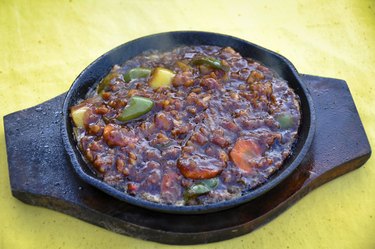
Depending on where you live, alligator meat may be as common as beef. Alligator is a game meat typically sold frozen. In general, most game meats have less saturated fat and fewer calories than commercially raised beef, pork and chicken, according to the South Dakota Department of Health. Alligator tastes similar to chicken and provides high-quality protein similar to lean beef.
Calorie Comparison
Video of the Day
A 3.5-ounce serving of alligator meat -- about the size of a deck of playing cards -- contains 232 calories, according to the Florida Department of Agriculture and Consumer Services. This amount is slightly less than that of a typical cut of beef. For example, a 3.5-ounce serving of rib-eye steak with the fat trimmed contains 291 calories, according to the U.S. Department of Agriculture.
Video of the Day
Protein Match Up
Where alligator really shines is in its protein content. Most game meats have more lean muscle tissue than domestic meats have, and alligator is no exception. That same 3.5-ounce serving of alligator packs a punch with close to 46 grams of protein. That's twice as much as the typical cut of domestic beef. A serving of rib-eye steak provides 23 grams of protein, according to the USDA, which is still a good amount.
Fat Wars
One of the drawbacks of beef is its saturated fat content, and even one of the leanest cuts of beef is no match for the low-fat content of alligator meat. Consider this: a 3.5-ounce serving of top sirloin contains 14 grams of total fat and close to 6 grams of saturated fat. The same serving of alligator meat contains only 4 grams of fat and zero saturated fat. Other cuts of beef are even higher in fat. A 3.5-ounce serving of rib-eye steak contains 21 grams of fat and close to 10 grams of saturated fat. In addition, alligator meat contains zero cholesterol.
Handling, Preparation and Safety
The choice cut of alligator is the tail meat, but you can also find ribs, nuggets and wings, which are the front legs. Keep alligator meat in the freezer until you're ready to use it, and thaw it in the refrigerator. Wash your hands, utensils and surfaces after handling the raw product. You can use alligator meat to make fillets, sausages, stews, soups, patties and taco filling. Scientists found alligator to contain high levels of the contaminant mercury, reports a September 2006 ABC News article. As with high-mercury fish, you may need to avoid alligator meat if you're pregnant or nursing.
- South Dakota Department of Health: Healthy Hunter -- Recipes From Mild to Wild
- Florida Department of Agriculture and Consumer Services: Alligator
- USDA National Nutrient Database: Rib Eye Steak
- USDA National Nutrient Database: Top Sirloin
- Florida Department of Agriculture and Consumer Services: Alligator Meat
- ABC News: Mercury Contamination Moves Beyond Fish